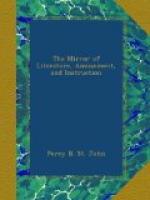[Greek: S.G.]
* * * * *
TO MISS MITFORD,
On reading her “Lines to a Friend, who spent some days at a country inn, in order to be near the writer."
IN NO. 386, OF THE MIRROR.
(For the Mirror.)
“My noble friend! was this a place for thee? No fitting place” “No fitting place” to meet thy “noble friend,” Where “heart with heart” and “mind with mind” might blend? “No fitting place?” now, lady, dost thou wrong The magic might that appertains to song, And humbly I refute thee—though it seem Uncourtly bold; for at Castalian stream I never drank; but oft my spirit bows Before that altar where thy genius glows: And who can fail to worship who have seen Foscari’s frenzy in thy tragic scene? Beheld Rienzi light the latent fire Of swelling liberty in son and sire; Or left the seven-hilled city’s Roman pride— With Caesar’s pump, and Tiber’s classic tide; And wander’d with thy muse to homely bowers, Of verdant foliage wreathed with varied flowers. But pardon, lady, scarcely need I tell, That song delights in Nature’s haunts to dwell; Eschews the regal robe and stately throne, To walk, enraptured, in a world its own. O’er sylvan scenes the muse her radiance flings; And hallows wheresoe’er she rests her wings. And thou, all joyous in her blessed smile, (Soft as the moonbeam on a monkish pile,) Art gifted with the godlike power to give A speechless charm to meanest things that live; And lifeless nature where thy voice is heard, Like midnight music of the summer bird, Receives new lustre. E’en the “taper’s” light, Which in the lowly inn illumed the night, The “wood-fire” warm, and “casement swinging free,” Were stamp’d with teeming interest by thee. What higher bliss than listening by thy side Within that cot thy genius sanctified? Though on thy “noble friend” the diamond shone, Thy words were richer than the precious stone; Though on that head there bent the rarest plume, Thy looks could well a loftier air assume; Though theirs the pride of coronet and crest, Thyself wert clad in Inspiration’s vest: And all these baubles, beauteous in the sight, Might veil their lustre in thy glorious light.
Then, lady, call it not a “selfish
strain,”
Thy supplicating wish to “come again.”
Deem not the “village inn”
“no fitting place”
To greet congenial feeling face to face;
To learn that genius no distinction knows.
But doats upon the meanest flower that
blows;
Where e’en thy friends might drop
their title’s claim,
Forgetting honoured race and ancient name;
Where round your souls the flowers of
song might twine,
Lost in the rapture of the bard’s
design.
* * H.
* * * * *




